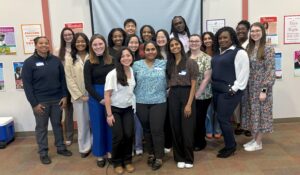By: Javacia Harris Bowser
Nearly 100 percent of sex trafficking victims are seen by a healthcare provider while they’re being trafficked. Yet many nurses, doctors, and hospital staff haven’t been trained on how to identify patients who may be at risk. Dannelle Paz is on a mission to change that.
As an Albert Schweitzer Fellow, Dannelle is working with Children’s Hospital Intervention and Prevention Services to increase awareness of child sex trafficking. Dannelle, who is pursuing a Doctor of Nursing Practice at Samford University’s School of Nursing, currently works as a certified registered nurse anesthetist (CRNA) for Children’s Hospital. For her project, the initial target population for awareness education is the nursing staff. However, plans are in the works to expand this education to other healthcare providers and hospital staff.
Dannelle admits that child sex trafficking is an issue that wasn’t on her radar until she began to learn more about it through a small group at Church of the Highlands. When she started talking about the issue with some of her colleagues, she realized many of them also thought sex trafficking was only a problem in other countries.
“I realized as nurses and advanced providers at a children’s hospital, none of us knew anything about it,” Dannelle says. “And I realized that it was happening everywhere. Nobody was immune to it.”
Dannelle has developed an online learning module to teach nurses the signs and symptoms of trafficking, the red flags they should look out for, and the right questions to ask.
“Once you have that information, you’re looking through a different set of eyes when children are coming in seeking care,” Dannelle explains.
Along with learning the telltale signs of trafficking, Dannelle hopes the lessons will also change attitudes – especially toward patients who test positive for substance use.
“The number one thing, I think, is looking past positive drug screens, to overcome the bias of that and look deeper into the reasons of why,” Dannelle says. “Typically, there’s a reason why a child or teen is using drugs. And it doesn’t always mean they’re being trafficked, obviously, but they’re often overlooked.”
After completing the training, nurses will be quizzed on what they learned and must score 90 percent to pass. Dannelle will also follow up with nurses who complete the training to find out how they’ve used it in their everyday practice and if it’s enhanced their ability to care for patients.
Dannelle has trainings for other healthcare professionals and hospital staff in the works. She’s also working with the Alabama Board of Nursing to make trafficking education required for nurses to receive and renew their licenses.
“Within two years, all 97,000 nurses should have awareness education on this to protect kids,” she says. “And not just kids, but everyone.”
Doing More
Dannelle’s time pursuing her Doctor of Nursing Practice has been extra special because her daughter Emily has been by her side. Emily graduated from Samford with a bachelor’s in nursing this month.
Dannelle, who will complete her DNP program in the spring of 2024, says Emily has helped her navigate technology.
“We definitely have different strengths,” Dannelle says. “She’s much more computer savvy than me.”
Being in school with Emily, however, has also shown her how stressed many young students are.
“There’s just so much pressure and there really doesn’t need to be,” Dannelle says.
She isn’t certain what she wants to do once she completes her DNP program but she knows eventually she wants to teach at the collegiate level so she can help students lower their anxiety and increase their self-esteem. Most of all, she wants to help them enjoy learning more.
“It’s very stressful and it should be fun,” she says. “You know, it’s a lot of hard work, but it can still be something they’re looking forward to instead of dreading, worried that they’re going to fail out.”
Balancing work and school could have been stressful for Dannelle, but she says after raising three kids she’s practically a pro at time management.
“I’ve been juggling stuff for years,” she says. “I like being busy. I don’t do idle very well.”
The key, she says, is to put your planner to work and schedule everything. That’s how she was able to add the Albert Schweitzer Fellowship to her plate. She recommends any graduate student looking to make an impact in their community consider applying for the fellowship too.
“The idea often stays an idea until you have support and encouragement and almost a recipe book or roadmap to get to the end,” she says. ASF gives you that guidance, she says.
“I think it really does give you more confidence,” Dannelle adds.
She went on to say that ASF expanded her horizons too.
“Seeing other professionals in medical school, audiology, pharmacy, and how they have chosen projects to impact other areas in the state from a different focus, I think it broadens your own perspective on what you can do,” she says. “It gives you permission to do more and motivation to do more to impact change.”


